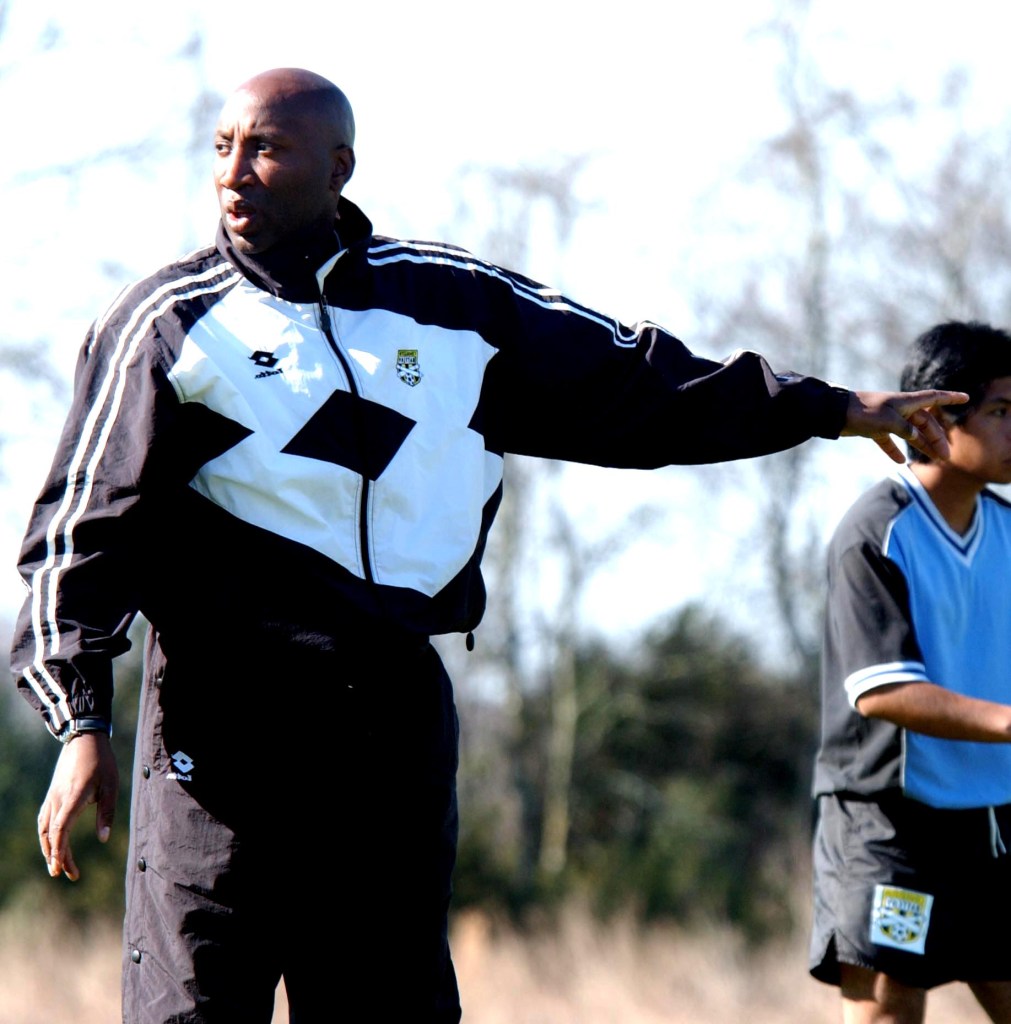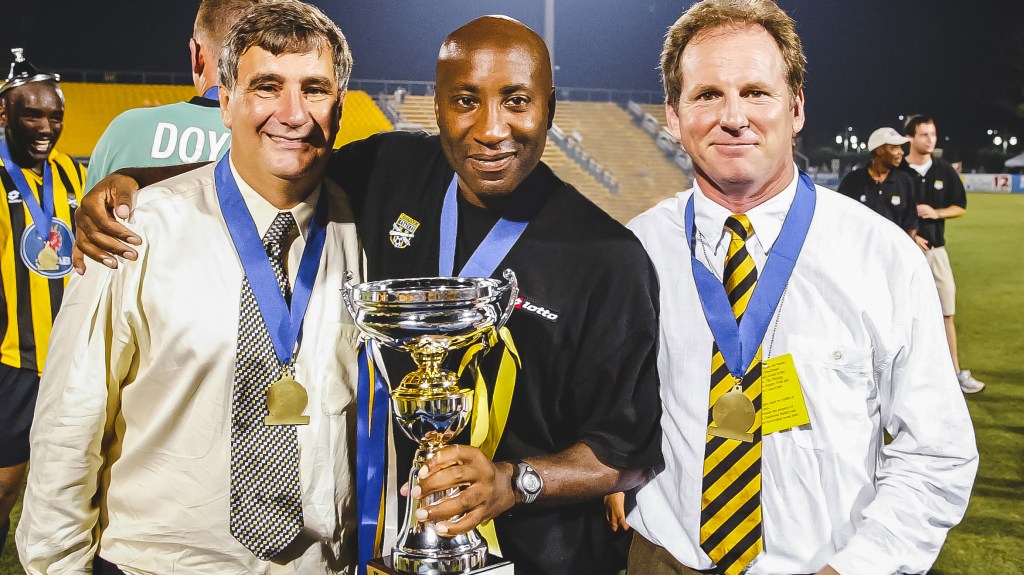
As part of Black History Month, we caught up with former Charleston Battery head coach Chris Ramsey, who led the club from 2001 to 2004. His tenure included winning the 2003 USL A-League title and becoming the first and only Black coach to do so in A-League history.
We spoke with Ramsey to discuss his stay in Charleston, the formidable squads he led, his work in empowering young coaches, being appointed Member of the Order of the British Empire (MBE) and more. Check out everything he had to say in the Q&A below:
How did you initially end up with the Battery in 2001?
It’s actually a funny story. I was in New Orleans with a friend working at a camp and I got a call from the son of Alan Dicks, the previous Battery coach, and he told me that his dad has left Charleston and that I should fax my CV through. So, I did, and fortunately, Tony Bakker and Nigel Cooper picked it up and invited me over from New Orleans to have an interview.
What was special about those early 2000s teams, and especially the 2003 squad?
All the squads were really good, even the first squad in 2001 that just got into the playoffs. We had some good leadership, like Dusty Hudock, Terry Phelan and Paul Conway.
We had some people who had been there and seen it and then we added some good people, like Justin Evans and Josh Henderson. There were quite a lot of leaders, which was difficult to manage at times, because they’d all played and they’d all been around already. Then you also had Rudy Dixon and Mark Watson, center-halves (center-backs), they were solid and came with real quality skills. Teddy Chronopolous, very skillful, stylish player and kept things ticking as a good passer.
All the players we had had something to offer, in terms of leadership and skills. And I think that’s what got us through the difficult times. In the 2002 playoffs, we had been a bit naive in the postseason and we used losing to Richmond to spur us on the next year, when we won it all in 2003. We went on an unbelievable run where we just kept winning. And what was good about that was there was a good team spirit and the owners were very supportive of us.
Aside from the 2003 title, what would you say was your fondest memory in Charleston?
I’d say the warmth of the club, really. I was working with the front office and Mike Anhaeuser, and they all made it easy to slip into working at the club, because they took away a lot of the worries that come with the job.
Augie later went on to do brilliant work and he was very professional in the way he handled himself and helped me train the team. And Andrew Bell was unbelievable in priming me into the local politics and how to conduct myself in a Southern state, having been the only Black head coach in the league at the time, since it was a very different environment to what I was used to.
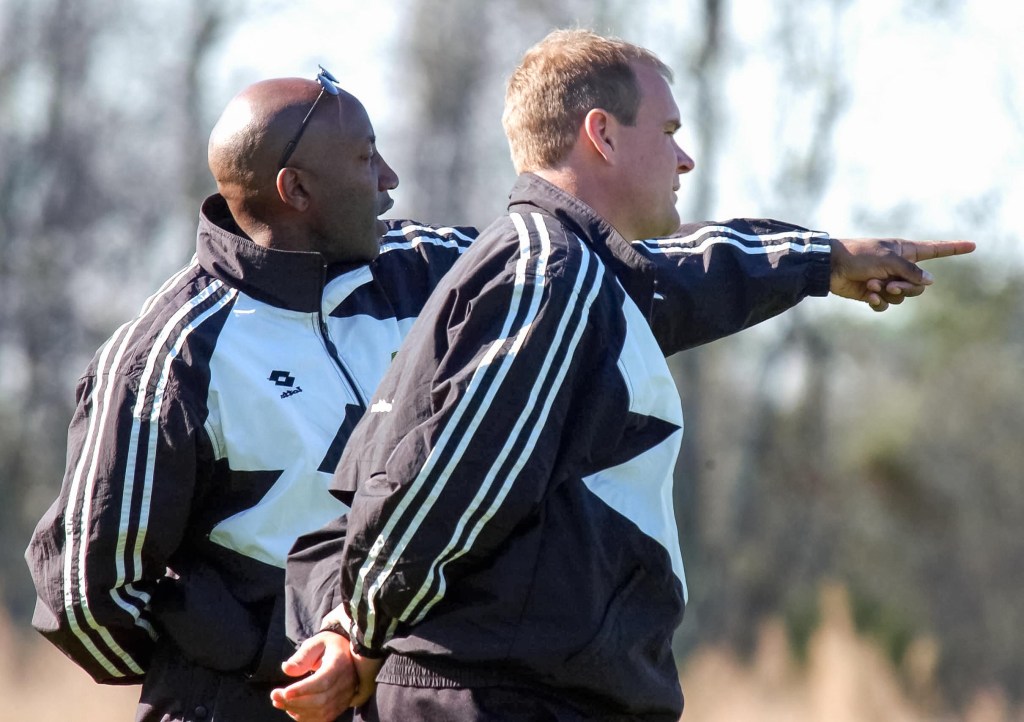
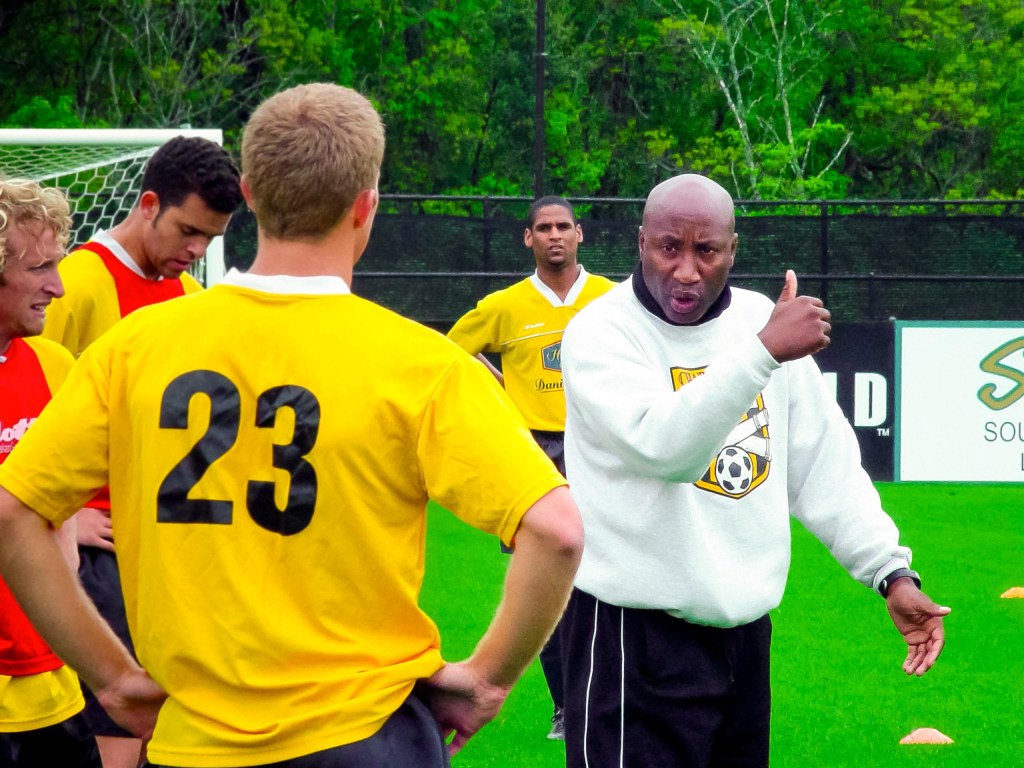
Did you know you were the first Black head coach to win a USL A-League title?
I didn’t know that at the time. Someone pointed it out to me recently but I didn’t know that I didn’t know that at the time. At that moment, there were hardly any Black head coaches in U.S. soccer. I had been an assistant coach with the Cocoa Expos before with Ricky Hill, and we were probably the only Black combination at that time, back in the 1990s. So, I wasn’t aware that I was the first and only one until recently.
What challenges did you face earlier in your career as a coach that you had to overcome?
As you may know, you’re going to have challenges as a person in society, the way people may treat you and the racism and the bias that people have. In South Carolina, I was aware there was a lot of past segregation and there is a lot of awareness of how difficult it is for there to be a Black head coach with a professional football team.
To overcome it, the fact is that I’ve had to deal with it all my life having come from England. Back in the ’70s and ’80s, there were monkey chants coming from the stands when I played.
However, the people at the Battery made it quite obvious from the start that I was going to be embraced. And the community around the Charleston Battery made sure that I was going to be embraced, too. So, fortunately for me, I was able to overcome it by, one, trying to be as successful as I could and, two, understanding that it doesn’t change overnight. Anybody going through those sorts of things, although it’s difficult, it does spur you on to do better.
How did your time with the Battery help you in your coaching career and change-making pursuits?
One of the things about being at the Battery and in the USL, it’s such a diverse league, in regards to different parts of the country that you play; the weather, the environment, the traveling. It definitely gave me a good platform to go back to England and achieve what I achieved, working in the Premier League and in the EFL Championship.
So, the experience helped me to understand more about working with different types of players, different nationalities, and coming across different ethnicities in the coaching styles. It definitely did help me.
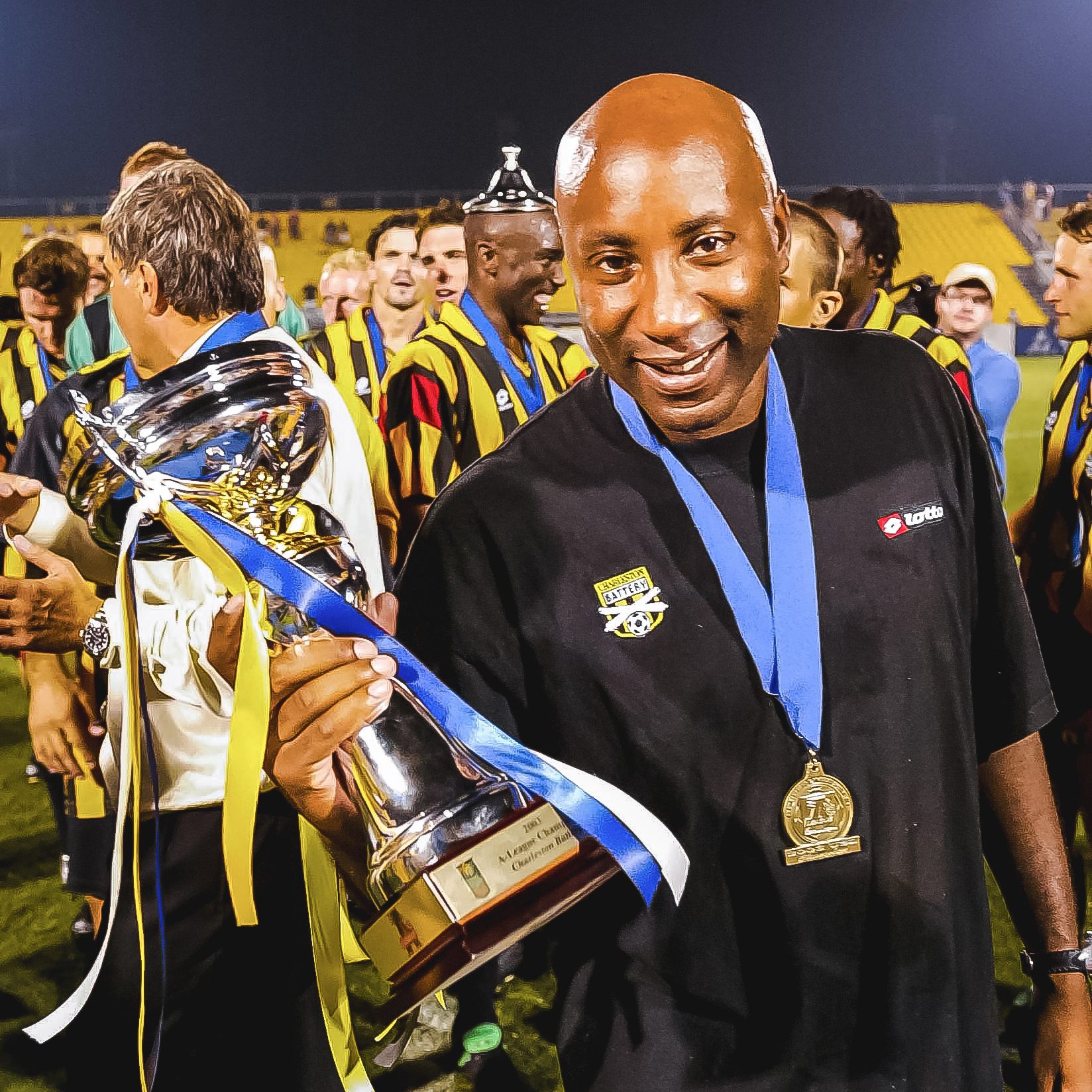
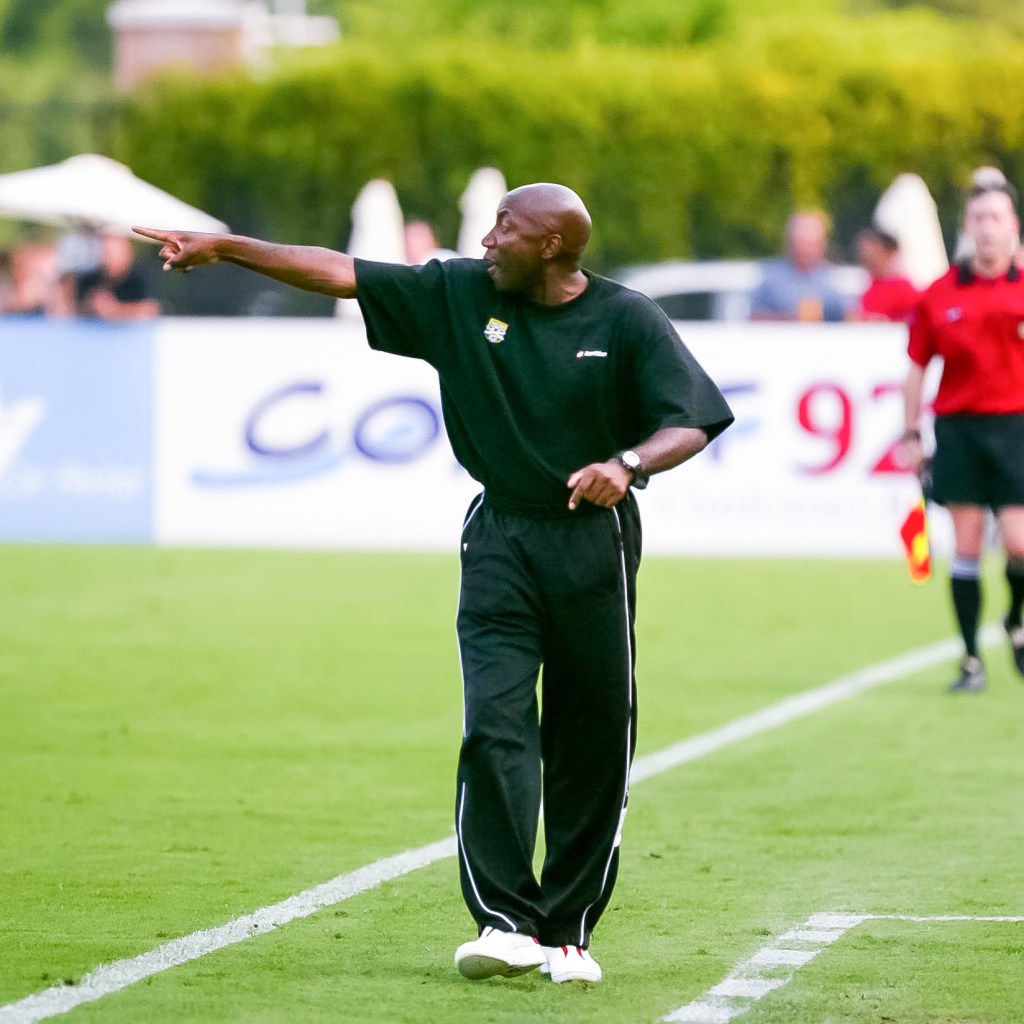
How have you worked to empower other Black coaches, or Black players interested in coaching, to follow the trail you blazed?
First things first, everybody needs to be qualified. Secondly, you need to do the groundwork in regards to becoming a skillful coach.
But, I think all that aside, I think it’s not really solely about the players and the coaches getting an opportunity, it’s also about the decision-makers having a fair playing ground. That’s where it lies, really. Because I do believe that there are many coaches now who are Black and from different minorities who deserve to have an opportunity. But unless we change what goes on in the boardroom, I think we’re going to have this problem for a long time.
At the moment, I’m part of many groups in England that work towards diversity in all sports, not just football. It’s something that I’m passionate about. I believe that it’s important that, if you have a platform, you use it also to educate people. People sometimes are not totally aware of what’s happening.
It’s also important for me that many of my colleagues, who are White, are starting to understand that, unless they talk as well, we’ve got no chance of changing it. This is because it won’t just be changed by the minority speaking up, it needs to be changed by the people who are not affected, too. Until the people that are not impacted speak up, it’s not going to change.
What has been some of your latest work in developing young coaches?
Coach education is something that I do in England, I just did some work recently for the Premier League. I was helping coaches who were training and preparing to become the coaches of clubs to make sure they were prepared. The Premier League has different schemes for coaches, some for minorities and retiring players who are going into coaching as well. I left Queen’s Park Rangers a month ago and the Premier League asked me to come in and help prepare the coaches in the courses for their next moves.
It’s important to get people prepared, since the more prepared you are, the more confidence you will have. I think when you’re walking into a room and you already know that you’ve got obstacles in the way, you’re not going to be very confident.
And I think the biggest problem is that a lot of the time people are judged based on how well another Black coach did. That shouldn’t be how it goes. Real equality comes down to how equal is the recruitment process. Does somebody who’s Black have to be the absolute best in order to get a job, when there are counterparts who may not be very good, that are getting jobs? Say, Chris Ramsey leaving the Charleston Battery a year after I won the title, that shouldn’t deter another Black coach from getting the job; they shouldn’t be judged by my success or failure.
You were appointed MBE for services to football and diversity in sport in 2019, what was that honor like?
At first, I did think the letter was a bill! (Laughs) Because any brown envelope that comes through the door in England is usually a bill. So, to receive that from the Prince and Buckingham Palace was an honor for me and my family, but also an honor for everybody who’s helped me. I felt it was an honor for them and more dedicated to them. It was for two things, services to football on its own and diversity in sport on its own, that’s important to me.
People spoke to me about having a long, hard career, especially with being a player back in the ‘70s and ‘80s, and being the first male Black coach for an England national team, and all that I’ve been fortunate to be a part of.
So, it was a major honor, and being at Charleston definitely played a part in it for me, in regard to my journey in making me more rounded and skilled, and understanding of a different part of the world where the history of Black people is prevalent.
